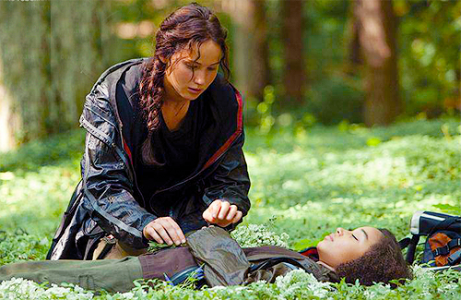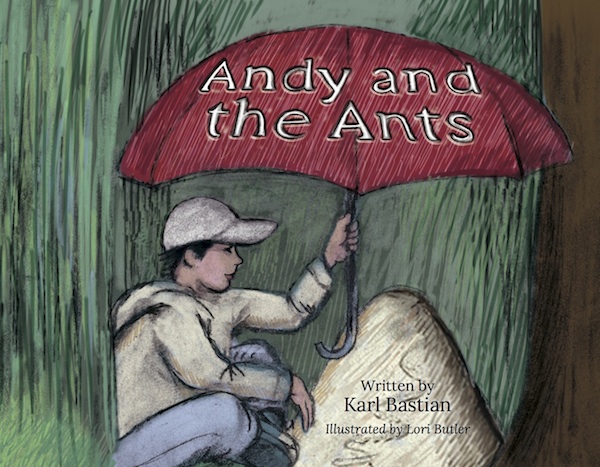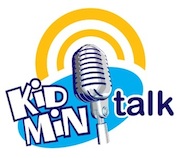“A little bit of hope,” the President says, is what is needed, “but not too much.” Just the right amount, he says, is far better than fear for controlling the masses. This is one of the many messages of the Hunger Games, a movie that blew away Twilight on its opening night, and in its second week, has given a beating at the box office to Mirror Mirror and Wrath of the Titans combined.
What is so powerful about this movie? Young people are flocking to the movie, and others, like myself, are going to see what all the fuss is about. The plot, at its simplest description, is revolting to many – randomly selected kids killing kids in a nationwide politically motivated reality TV show to keep down any future rebellious uprisings. At a deeper level, it is symbolic of the loss of innocence of our generation. While it was difficult to watch, I found it no more violent than the average video game I’ve seen even Christian kids playing. (A statement of fact, not approval.) What makes it especially difficult is that the audience is drawn toward rooting for the main characters, but for these protagonists to “win,” they must kill other children. The fighters, or “tributes,” are given a mentor who is a previous victor of this game. His first bit of advice, given while drunk (since even he seems to understand the grim nature of what is to come and the unlikeliness of their success), is simply, “Embrace the probability of your imminent death; and know deep down in your heart, that there is nothing I can do to save you.”
I’ll leave story summaries and deeper analysis to those who can do it better (See Glen Wood’s Review), but for me, I am glad to have seen it so that I can get a glimpse into where our culture is, and where it is going. I did not find it as shocking as I expected it to be. The plot was not overly original; there have been many films of this nature. Claude Van Damme’s Hard Target used homeless people, for example, and there are many others with a “kill or be killed” plot. What made this different, of course, was the introduction of young kids and the nationwide reality TV show.
I met a family member of the author at my viewing of the show and have extended an invitation to do an interview with Suzanne Collins, who wrote both the books and the film adaptation. While I won’t hold my breath, I would love to know, beyond the basic plot/story, what message she was trying to communicate. What trends does she see in our country and culture that concern her? It is easy to jump all over “kids killing kids” in a movie and get irate, but do we give the same passion to the REAL killing of kids happening around us? Do we get equally upset by the desensitizing of kids to others by the way we idolize those who are attractive, or smart or from certain economic classes or races? (This is addressed in the film by the way those who are free look down on those in the districts from whom the ‘tributes’ come.) Do we get worked up about sex trafficking and child abuse and kids who are home alone so their parents can work more than necessary to acquire the “American Dream” while these kids are essentially abandoned? Do we get worked up over the promiscuity of girls trying to live up to what the world says they need to be in order to be loved or desired? Are we equally concerned about the drug use or crime of boys trying to impress each other and feel powerful and successful because that is what the media and entertainment world say is what it means to be a man? It’s always easy to get worked up over a movie because it’s a stationary target – whereas these other things are more fluid and moving, and (gulp) we are guilty of them as well. We wouldn’t want to shoot ourselves by shooting at them.
Yes, Hunger Games is violent. Our culture is violent.
Yes, Hunger Games has people obsessed with reality TV. So is our culture.
Yes, Hunger Games shows a lack of value for human life. Bingo.
Maybe Hunger Games should have been titled Mirror Mirror?
Join the Discussion about Hunger Games on Kidology.org










Mirror Mirror indeed. Let’s hope that kids are looking in the “mirror” and are realizing what is going on in our culture like Katniss does in the books. I’m just hoping, and have confirmed with a few teens at my church, that this is a chance to point to an example and say violence, abortion, and sin is “wrong”- because, let’s face it, some kids have never heard that…EVER! Life still looks polished for them, but they don’t see what’s really happening: evil is winning. Maybe they can see that in the mirror. Teens, not kids. Thankfully didn’t see anyone under 14 when I went to see it. And good to know Spoiler: There’s actually a part in the 3rd book which I just finished reading where you find out that “Panem” (the countries name) comes from the Roman phrase “panem et circenses” which means “Bread and circuses”. Katniss realizes it’s all just repeated history from the Roman empire and that the bread and the hunger games kept everyone from asking questions and seeing what was happening- everyone was loosing their humanity.
Hopefully we will wake up and stop being Rome. Or we will follow in Rome and the Capitals footsteps.
Thanks for your comment, now you’ve got me wanting to read the books!